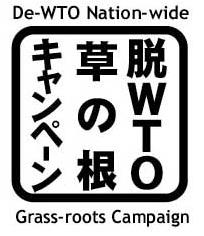Monday, April 10, 2006
中川農相「農業交渉で妥協の用意」、フィナンシャル・タイムズで語る
(以下はAMネット川上さんの翻訳です。wtongoの、メーリングリストからの転載です)。
日本、「貿易に関する立場で譲歩の容易」
Japan ‘ready to concede ground over trade’
By David Pilling in Tokyo
2006年3月22日 フィナンシャル・タイムズ
日本の農業担当大臣によれば、日本は貿易自由化協議を終結することに貢献するために、農産物での更なる譲歩を行う用意があるが、ブラジルのような他の国々が、堅固に身を固めた立場から動かない限り、その『トランプカード』は明かさないという。
フィナンシャル・タイムズとのインタビューで、中川昭一氏は、日本は非農産物輸出国として、農産物貿易自由化から何も得るものがないので、守勢にあった。しかし、時期を得て、「農業でのカードを見せることもできる」と中川氏は述べた。
中川氏は、以前にも農林水産大臣になったことがあるが、10月に農業担当大臣職に指名された。また、彼は前貿易担当大臣であったので、伝統的に、保守的な農林水産省に対して、より自由化された貿易アジェンダを持ち込むという憶測も膨らんだ。
農林水産省の高関税による日本の食糧安保、農民の保護という使命ために、これまで、多くのコメンテーターからは、農林水産省は貿易自由化の障害として見られていた。
他の国々に有望(encouraging)と評されるものだったが、今年、日本政府は日本の老齢農民への補助金とその生産高とのリンクを分断することを目的にした法案を国会に提出した。緑の政策として知られている、新しい支払い方法は世界貿易機関からは貿易歪曲的なものとは考えられていない。
中川氏は、「日本はWTOというクラスでの最優秀優等生の一人だ」とも述べた。彼は、これが、生産物の多くを輸出する農業者に直接補助を行っている米国のような他の国々を批判するための権利を与えてくれると述べた。
日本の農業担当大臣は、いわゆるG20という途上国グループの国々を代表するブラジルが、インドとともに、今年末までに終結することになっているドーハ・ラウンドの貿易協議を打開するための重要な鍵になっていると述べた。
ブラジルや他の国々は、日本が農業での手を見せる前に、非農産物市場アクセスでの譲歩を行うべきだと、彼は述べた。
日本が、コメや皮革といった非常に保護された分野での譲歩を行うことによって、この膠着状態を崩していくべきだという主張を否定しつつ、「われわれは、提案を同時にテーブルに載せなければならない」と述べた。
「もしも先に持ち手を明かしてしまうならば、相手はそれを前提として、さらなる譲歩を求めてくる。」
オーストラリア、ブラジル、インド、日本、EU、USといった「G6」の大臣によるロンドンで今月行われた会議のことに触れて、中川氏は、ブラジルは非農産物での重要な譲歩を行うことによって、この膠着状態の交渉を打ち破るところまで来ていた。
日本とオーストラリアは、開き直ってブラジルの提案を受け入れた。その点で、ブラジルの外務大臣であるCelso Amorimは、その提案を取り下げてしまったと述べた。
Financial Times, Wednesday March 22 2006
Japan ‘ready to concede ground over trade’
By David Pilling in Tokyo
Japan is prepared to make further concessions on farm products to help
conclude trade liberalization talks, but will not reveal its “trump card”
until other countries, such as Brazil , budge from entrenched positions,
according to the Japanese farm minister.
In an interview with Financial Times, Shoichi Nakagawa said Japan was on
the defensive because, as a non-farm exporter, it had nothing to gain from
agricultural liberalization. However, when the time was right, Mr Nakagawa
said, he would “be able to show my trump card in agriculture”.
Mr Nakagawa, who was appointed to the farm portfolio in October, has served
as farm minister before. He is also a former trade minister fuelling
speculation that he might bring a more liberal trade agenda to the
traditionally conservative agriculture ministry.
In the past the ministry has been seen by many commentators as an obstacle
to trade liberalization because of its mandate of protecting Japan’s food
security and its farmers through high tariffs.
This year the Japanese government has introduced legislation to parliament
aimed at severing the link between subsidies paid to Japan’s aging farmers
and the amount they produce, a move described as encouraging by other
countries.
The new form of payments, known as green-box payments, are considered non
trade distorting by the World Trade Organization.
Mr Nakagawa said: “Japan is one of the best students in the class of the
WTO.” He said that this gave Tokyo the right to criticise other countries,
such as the US, which he said directly subsidised farmers, who exported much
of their produce.
Japan’s farm minister said Brazil which, together with India, represents
the so-called G20 developing countries, was an important key to unlocking
the Doha round of trade talks, due to be completed by the end of this year.
Brazil and other countries, he said, must make concessions on
non-agricultural market access before Japan could show its hand on
agriculture.
“We have to place our proposals on the table simultaneously,” he said,
rejecting assertions that Japan should break the deadlock by making
concessions on heavily protected sectors, such as rice and leather.
“If you are the first, then others will just pocket that proposal and ask
for more.”
Referring to a meeting this month in London of ministers from the “Group
of Six”- Australia, Brazil, India, Japan, the EU and the US-
Mr Nakagawa said Brazil had come close to breaking the deadlock by offering
important concessions on non-farm goods.
He said Japan and Australia had called Brazil’s bluff by accepting the
proposal, at which point Celso Amorim, the Brazilian foreign minister, had
withdrawn the offer.
以上
日本、「貿易に関する立場で譲歩の容易」
Japan ‘ready to concede ground over trade’
By David Pilling in Tokyo
2006年3月22日 フィナンシャル・タイムズ
日本の農業担当大臣によれば、日本は貿易自由化協議を終結することに貢献するために、農産物での更なる譲歩を行う用意があるが、ブラジルのような他の国々が、堅固に身を固めた立場から動かない限り、その『トランプカード』は明かさないという。
フィナンシャル・タイムズとのインタビューで、中川昭一氏は、日本は非農産物輸出国として、農産物貿易自由化から何も得るものがないので、守勢にあった。しかし、時期を得て、「農業でのカードを見せることもできる」と中川氏は述べた。
中川氏は、以前にも農林水産大臣になったことがあるが、10月に農業担当大臣職に指名された。また、彼は前貿易担当大臣であったので、伝統的に、保守的な農林水産省に対して、より自由化された貿易アジェンダを持ち込むという憶測も膨らんだ。
農林水産省の高関税による日本の食糧安保、農民の保護という使命ために、これまで、多くのコメンテーターからは、農林水産省は貿易自由化の障害として見られていた。
他の国々に有望(encouraging)と評されるものだったが、今年、日本政府は日本の老齢農民への補助金とその生産高とのリンクを分断することを目的にした法案を国会に提出した。緑の政策として知られている、新しい支払い方法は世界貿易機関からは貿易歪曲的なものとは考えられていない。
中川氏は、「日本はWTOというクラスでの最優秀優等生の一人だ」とも述べた。彼は、これが、生産物の多くを輸出する農業者に直接補助を行っている米国のような他の国々を批判するための権利を与えてくれると述べた。
日本の農業担当大臣は、いわゆるG20という途上国グループの国々を代表するブラジルが、インドとともに、今年末までに終結することになっているドーハ・ラウンドの貿易協議を打開するための重要な鍵になっていると述べた。
ブラジルや他の国々は、日本が農業での手を見せる前に、非農産物市場アクセスでの譲歩を行うべきだと、彼は述べた。
日本が、コメや皮革といった非常に保護された分野での譲歩を行うことによって、この膠着状態を崩していくべきだという主張を否定しつつ、「われわれは、提案を同時にテーブルに載せなければならない」と述べた。
「もしも先に持ち手を明かしてしまうならば、相手はそれを前提として、さらなる譲歩を求めてくる。」
オーストラリア、ブラジル、インド、日本、EU、USといった「G6」の大臣によるロンドンで今月行われた会議のことに触れて、中川氏は、ブラジルは非農産物での重要な譲歩を行うことによって、この膠着状態の交渉を打ち破るところまで来ていた。
日本とオーストラリアは、開き直ってブラジルの提案を受け入れた。その点で、ブラジルの外務大臣であるCelso Amorimは、その提案を取り下げてしまったと述べた。
Financial Times, Wednesday March 22 2006
Japan ‘ready to concede ground over trade’
By David Pilling in Tokyo
Japan is prepared to make further concessions on farm products to help
conclude trade liberalization talks, but will not reveal its “trump card”
until other countries, such as Brazil , budge from entrenched positions,
according to the Japanese farm minister.
In an interview with Financial Times, Shoichi Nakagawa said Japan was on
the defensive because, as a non-farm exporter, it had nothing to gain from
agricultural liberalization. However, when the time was right, Mr Nakagawa
said, he would “be able to show my trump card in agriculture”.
Mr Nakagawa, who was appointed to the farm portfolio in October, has served
as farm minister before. He is also a former trade minister fuelling
speculation that he might bring a more liberal trade agenda to the
traditionally conservative agriculture ministry.
In the past the ministry has been seen by many commentators as an obstacle
to trade liberalization because of its mandate of protecting Japan’s food
security and its farmers through high tariffs.
This year the Japanese government has introduced legislation to parliament
aimed at severing the link between subsidies paid to Japan’s aging farmers
and the amount they produce, a move described as encouraging by other
countries.
The new form of payments, known as green-box payments, are considered non
trade distorting by the World Trade Organization.
Mr Nakagawa said: “Japan is one of the best students in the class of the
WTO.” He said that this gave Tokyo the right to criticise other countries,
such as the US, which he said directly subsidised farmers, who exported much
of their produce.
Japan’s farm minister said Brazil which, together with India, represents
the so-called G20 developing countries, was an important key to unlocking
the Doha round of trade talks, due to be completed by the end of this year.
Brazil and other countries, he said, must make concessions on
non-agricultural market access before Japan could show its hand on
agriculture.
“We have to place our proposals on the table simultaneously,” he said,
rejecting assertions that Japan should break the deadlock by making
concessions on heavily protected sectors, such as rice and leather.
“If you are the first, then others will just pocket that proposal and ask
for more.”
Referring to a meeting this month in London of ministers from the “Group
of Six”- Australia, Brazil, India, Japan, the EU and the US-
Mr Nakagawa said Brazil had come close to breaking the deadlock by offering
important concessions on non-farm goods.
He said Japan and Australia had called Brazil’s bluff by accepting the
proposal, at which point Celso Amorim, the Brazilian foreign minister, had
withdrawn the offer.
以上
